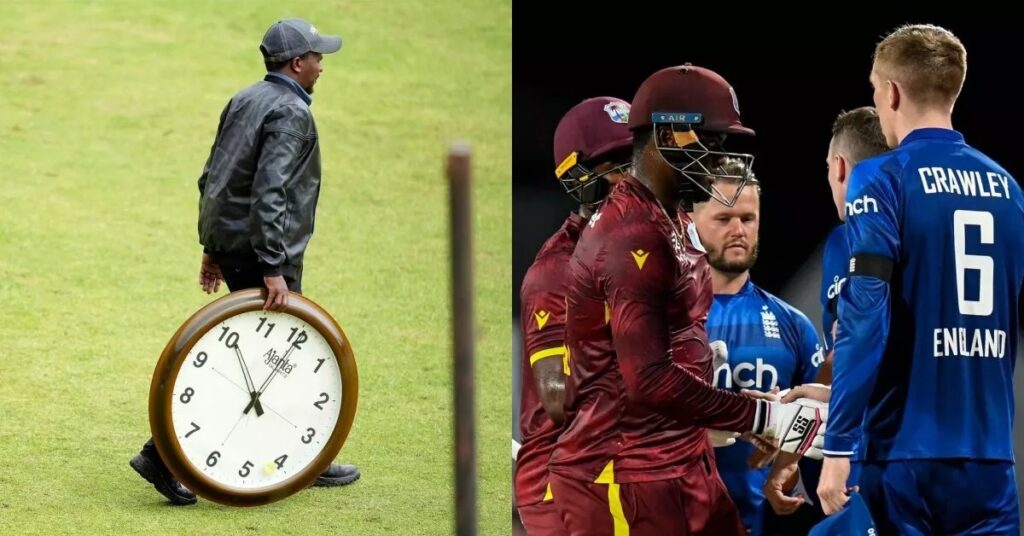Everyone is buzzing with anticipation as the 2024 T20 World Cup approaches. But do you know there will be something different this year? Well, one of the most significant changes introduced by the International Cricket Council (ICC) is the mandatory use of stop clocks between overs in limited-overs international matches (ODIs and T20Is).
This rule was first introduced on an experimental basis in December 2023 but now it has been included into the standard playing conditions for the world cup. Let’s see what exactly this rule is about and what its impact on the game.

Understanding The Stop Clock Rule
The stop clock rule is designed to improve the pace of play in limited-overs cricket.
Here’s how it works:
Time Limit Between Overs: The fielding side has 60 seconds to start bowling the first ball of their next over after the previous over is completed.
Third Umpire’s Role: The third umpire uses an electronic clock to keep track of the time between overs.
Warnings and Penalties: If the fielding side fails to be ready within 60 seconds, they receive two warnings. Further delays could potentially lead to penalties, although the exact details of these penalties haven’t been open to the public yet.
The Goal Of The Stop Clock Rule
The introduction of the stop clock rule aims to address several issues in the current format of limited-overs cricket:
One of the primary objectives of the stop clock rule is to speed up the game. Over the years, the pace of play in cricket has often been criticized, with unnecessary delays between overs causing frustration for fans and broadcasters alike.
By setting a strict time limit between overs, the ICC hopes to reduce time wastage. This rule ensures that players are ready to continue the game promptly, minimizing unnecessary interruptions.
For broadcasters and fans, consistent match durations are important. The stop clock rule aims to create a more predictable and reliable schedule, enhancing the viewing experience and making it easier for broadcasters to plan their coverage.
Background And Implementation
The stop clock rule was first introduced on an experimental basis in December 2023. During this trial period, the ICC monitored its effectiveness and gathered feedback from players, coaches, and officials. The positive response and the noticeable improvement in the pace of play led to its incorporation into the standard playing conditions for the 2024 T20 World Cup.
The decision to implement the stop-clock rule at such a high-profile tournament reflects the ICC’s commitment to modernizing the game and addressing the concerns of all stakeholders involved.
The rule has been met with mixed reactions, but the overall conclusion is that it will benefit the sport in the long run.
Potential Impact On The Game
The introduction of the stop clock rule is expected to have several impacts on the game of cricket:
Enhanced Viewer Experience
One of the most immediate benefits of the stop clock rule is the enhanced viewing experience for fans. By reducing the time between overs, matches are likely to be more engaging and fast-paced, keeping viewers entertained throughout.
Greater Accountability For Fielding Sides
The rule places greater accountability on the fielding side to be ready for the next over promptly. This could lead to more strategic planning and better time management during the game.
Increased Pressure On Captains
Captains will need to be more mindful of the time taken between overs. This added pressure could influence decision-making and tactics, potentially leading to more dynamic and aggressive gameplay.
Impact On Players’ Routines
Players will need to adapt their routines to comply with the new time limits. This could mean quicker changes of field positions, faster bowlers returning to their marks, and batsmen being ready to face the next delivery promptly.
Conclusion
The ICC’s new stop-clock rule for the 2024 T20 World Cup marks a significant step towards modernizing cricket and enhancing the overall experience for fans, players, and broadcasters.
By setting a strict time limit between overs, the rule aims to improve the pace of play, reduce time wastage, and ensure more consistent match durations. While there may be some initial challenges in adapting to the new rule, its long-term benefits are expected to outweigh any concerns.
As the world prepares for the 2024 T20 World Cup, the stop-clock rule will undoubtedly be one of the most closely watched and discussed aspects of the tournament.
Whether it achieves its intended goals remains to be seen, but it is clear that the ICC is committed to evolving the game to meet the demands of the modern era.
